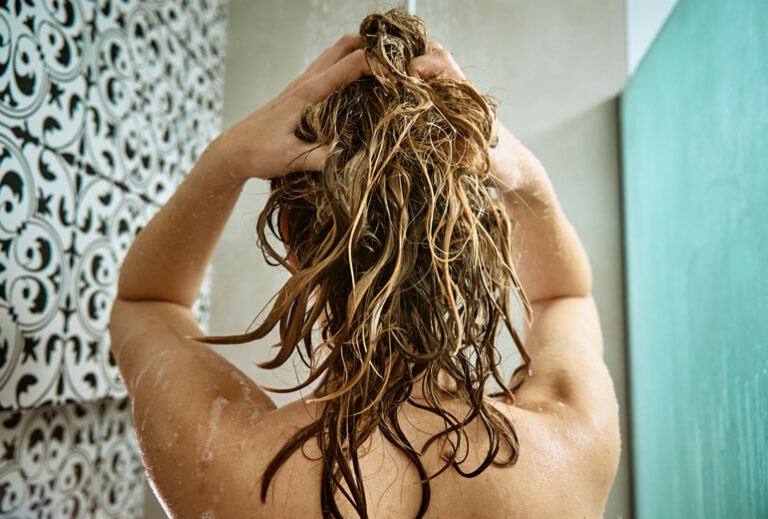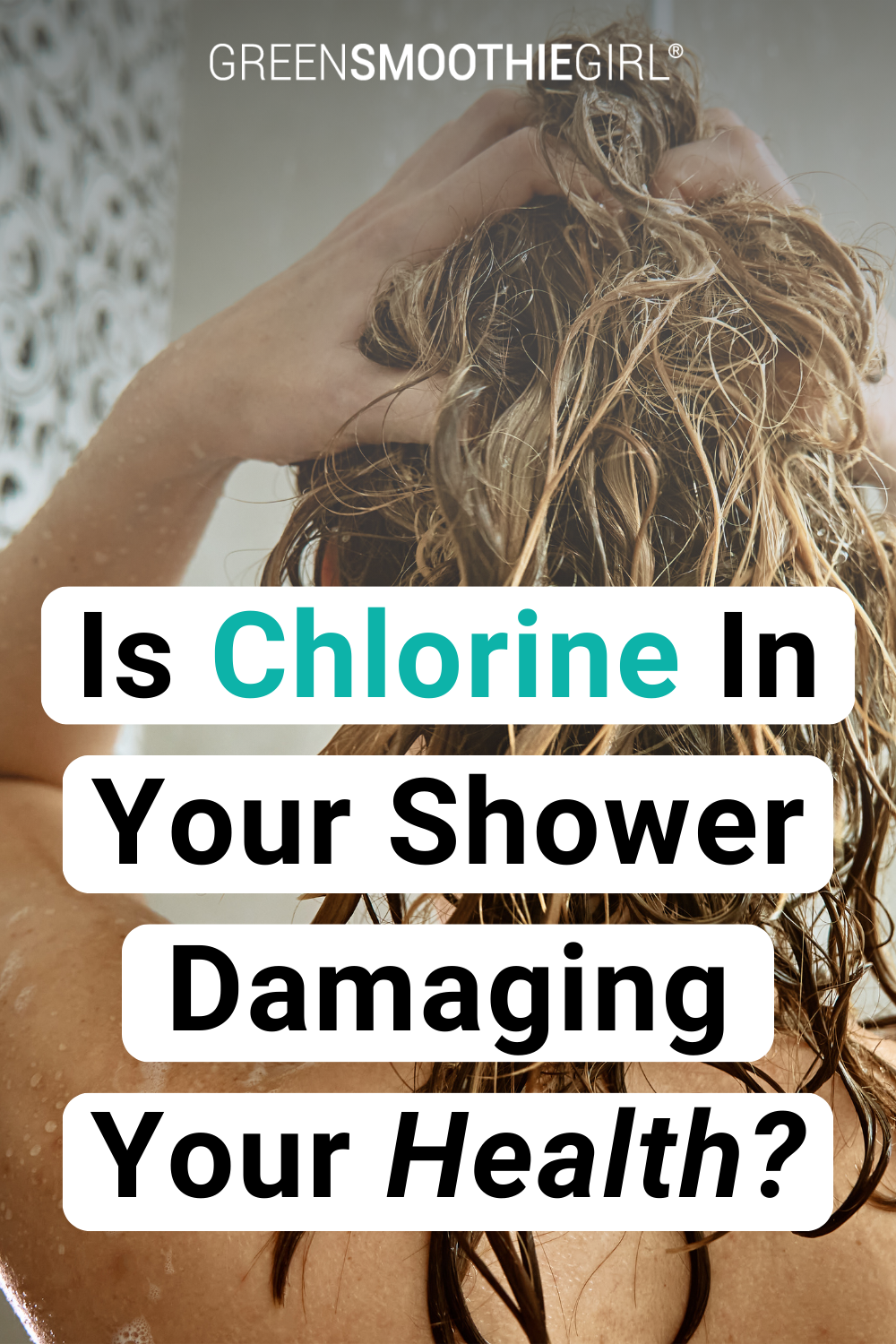Is Chlorine in Your Shower Water Harming Your Health?

We all love a long, hot shower, right? It's one of life’s relaxing pleasures.
But, due to chlorine being added to your shower water, you are likely being exposed to an endocrine-disrupting toxin that accelerates your skin’s aging and causes other harm to your health, especially your hormone system.
In fact, I think this is one of the endocrine disruptors that I’ve been studying, as I research why so many women are telling me they eat healthy and exercise and just can’t lose 10, 20, or even 40 pounds.
I can give you a quick and inexpensive solution, but I need to lay out the problem first:
In this article:
- Why are dangerous chemicals in your shower water?
- How does chlorine in your shower water harm your health?
- How can you make your shower water safe from the harmful effects of chlorine?
Why Are Dangerous Chemicals in Your Shower Water?
To kill parasites and bacteria, most U.S. governments add chemical agents, like chlorine, to the water supply. 1
Chlorine began to be used in U.S. water systems in the early 1900s because it killed salmonella bacteria. And almost all governments today continue to use it.
When you hear chlorine, you probably think of your friendly neighborhood pool. And, you probably filter your drinking water to protect yourself from drinking chlorine and other harmful chemicals.
But, did you realize that your shower water also contains chlorine?
In a hot shower, chlorine gas is released from water and easily breathed in and absorbed through your skin. The longer you shower, the greater the intensity of the gas.
In fact, you absorb far more chlorine in your skin than you could drink in a day!
A 10-minute shower is equivalent to drinking two liters of chlorinated water, according to research published in the journal Environmental Health Perspectives.2
Watch this short video to see proof that your skin absorbs chlorine:
How Does Chlorine in Your Shower Water Harm Your Health?
Breathing in and absorbing the chlorine in our tap water through regular showering can have serious negative effects on your skin, your hair, and your health.
Exposure to low levels of chlorine can cause mild side effects, like skin irritation, nausea, trouble breathing, and coughing. And, over time, higher levels of chlorine can cause increasingly serious side effects, like heart failure or pulmonary edema (fluid in the lungs).
High levels can even be fatal to humans, like during World War I, when chlorine was used to manufacture mustard gas.
Chlorine in Shower Water Ages Your Skin
Chlorine can also damage your skin and cause premature signs of aging. When you shower, heat opens your pores and allows the chlorine to seep into your skin.
(So, if you don’t get a cheap shower head filter, taking a cooler and shorter shower is one option.)
Chlorine strips the skin of its natural oils and causes it to dry and crack, which can lead to wrinkles.3
Chlorine also generates free radicals in the skin, causing oxidative stress and collagen degradation, which may lead to wrinkles, fine lines, and sagging.
Plus, the chlorine in shower water reduces the effectiveness of shampoo, conditioners, lotions, oils, and other skin products – leaving your skin drier and wasting money spent on these skin care products.
Chlorine in Shower Water Harms Your Hair
Chlorine absorbs natural oils that nourish your hair, causing your skin to lose its natural moisture level. It also bonds with proteins in the hair, making hair dry and brittle and causing color in the hair to wash out.
Chlorine May Disrupt Your Hormones
Chlorine is an endocrine-disrupting substance.
Endocrine disruptors are synthetic chemicals that disrupt or damage your body’s hormone-making organs or processes.
Your endocrine system is a complex network of organs and glands that work together to create, distribute, and regulate the hormones your body needs to function properly.
One study showed that boys who spent a significant amount of time in the pool before puberty were three times as likely to land in the bottom 10th percentile for testosterone levels.4
As I said, I think chlorine is one of the main exposures that make people with excess weight struggle to lose it, even when they eat a healthy diet and exercise.
(Luckily, we can detoxify, twice a year, and bring the toxic load way down, which is my main mission in life, helping people do this. Consider joining us now, or in January, when we always have 1,000 new Detoxers join us.)
Breathing in Chlorine May Harm Your Respiratory Health
When you shower in hot, chlorinated water, chlorine is not only absorbed through your skin, but it also vaporizes, so you’re inhaling it, which can harm your lungs.5
When you breathe in the chlorine fumes, the vapors are inhaled directly into your bloodstream, which is even worse than drinking chlorinated water.
Chlorine May Contribute to Cancer
When chlorine is used as a water treatment, it combines with organic matter to form trihalomethanes (THMs).
THMs are toxic when consumed, inhaled, or absorbed by the skin. One of the most common THMs is chloroform, a known carcinogen.6
In three Canadian cities, 36 cancers were attributed just to THM exposure through inhalation and skin exposure during showers.7
Additionally, a European study found that lifetime exposure to THMs from showers increased the risk of bladder cancer.8
One more data point: a Health Canada position paper said that 14-16% of bladder cancers may be attributed to chlorine by-products (CBPs) – which may be “the most important environmental carcinogens in terms of the number of attributable cancers per year.”9
The paper also links CBPs to abortions, low sperm count, birth defects, and respiratory problems.
Chlorine in Shower Water May Harm Your Gut
Chlorine is intended to destroy bacteria. So, it makes sense that it might disrupt the beneficial bacteria in our guts.
Of course, gut health is critical to our overall health. So, if you want to be healthy, you want to make sure you’re protecting your gut health.
You can do this by decreasing your exposure to chlorine, eating a high-fiber diet, and taking PreZyme Pro, which gives you 9M living organisms per dose, of 15 different effective probiotic strains.
Chlorine in Shower Water May Impact Your Brain
In 1992, industrial chemist J.O. Bercz showed that chlorinated water alters and destroys essential fatty acids – the building blocks of your brain and central nervous system.9
[Related: What’s the Best Way to Get Your Essential Fatty Acids? Fish Oil? Nooo!]
When chlorine mixes with water, free radicals are created, which oxidize EFAs, turning them rancid.
So, if you’re getting your brain-healthy essential omega-3s, like from our organic, sprouted seeds, but your shower water has chlorine, you might not be getting the full beneficial effects.
The harms of chlorine in your shower water may even go beyond your bathroom!
Some research shows that chlorine vapors spread into the rest of your home, further increasing exposure.
How Can You Make Your Shower Water Safe from the Harmful Effects of Chlorine?
Many European countries use ozone to clean the water, rather than chlorine. It’s a safer option.
But, in America, we use chlorine.
If you want to protect your health and reduce your toxic exposure to chlorine in your shower, the easiest and best thing you can do is to get a high-quality shower filter that works. Luckily, they aren’t expensive. If you already have a whole-home filtration system that removes chlorine, you’re covered.
I recommend the Shower Filter from Berkey Filters. It helps protect your hair and your skin – and reduces your toxic exposure – in a very affordable way!
The Shower Filter from Berkey Filters converts free chlorine into a harmless chloride, which is too large to evaporate or absorb through the skin.
After adding a filter to their shower, many people notice the difference in the skin and hair right away.
Plus, you’ll be taking an important step to protect your health and feel your best. Berkey has recently been stopped by the FDA from selling their water purifiers, and even their replacement filters for people who already own a Berkey.
Berkey is suing the FDA, and I support them, as I think this governmental agency squanders its resources persecuting natural-health companies and very little energy protecting us from toxic chemicals in our food, air, water, and products.
But the ONE product Berkey is still able to sell, right now, till their legal issues are resolved, is their showerhead water filter.
I did some research to investigate options, and theirs is the most effective one for the best price I found.
Frankly, I haven’t had a shower filter for several years, and I did this research again, myself because I don’t like my “Florida hair,” which resembles the descriptions above, as to the effects of chlorine on hair.
At first, I blamed it on the humidity and change in climate from Utah to Florida, but…I think it’s more than that.
I’m ordering this showerhead filter for my house right now, too!
Read Next: Endocrine Disruptors: 14 Common Chemicals That Affect Your Hormones

Disclosure: This post may contain affiliate links that help support the GSG mission without costing you extra. I recommend only companies and products that I use myself.
References
1. Rice, E. W., Clark, R. M., & Johnson, C. H. (1999). Chlorine inactivation of Escherichia coli O157:H7. Emerging infectious diseases, 5(3), 461–463. https://doi.org/10.3201/eid0503.990322
2. Weisel, C. P., & Jo, W. K. (1996). Ingestion, inhalation, and dermal exposures to chloroform and trichloroethene from tap water. Environmental health perspectives, 104(1), 48–51. https://doi.org/10.1289/ehp.9610448
3. https://www.health.ny.gov/environmental/emergency/chemical_terrorism/docs/chlorine_general.pdf
4. Nickmilder, M., & Bernard, A. (2011). Associations between testicular hormones at adolescence and attendance at chlorinated swimming pools during childhood. International journal of andrology, 34(5 Pt 2), e446–e458. https://doi.org/10.1111/j.1365-2605.2011.01174.x
5. Di Napoli, A., Agabiti, N., Ancona, C., Forastiere, F., Lo Presti, E., Corbo, G. M., D'Orsi, F., & Perucci, C. A. (2002). Respiratory effects of exposure to chlorine vapors during a swimming pool accident in a recreational center in Rome. Epidemiologia e prevenzione, 26(5), 240–247.
6. Zierler, S., Feingold, L., Danley, R. A., & Craun, G. (1988). Bladder cancer in Massachusetts related to chlorinated and chloraminated drinking water: a case-control study. Archives of environmental health, 43(2), 195–200. https://doi.org/10.1080/00039896.1988.9935853
7. Chowdhury, S., & Champagne, P. (2009). Risk from exposure to trihalomethanes during shower: probabilistic assessment and control. The Science of the total environment, 407(5), 1570–1578. https://doi.org/10.1016/j.scitotenv.2008.11.025
8. Villanueva CM, Cantor KP, Grimalt JO, et al. Assessment of lifetime exposure to trihalomethanes through different routes. Occup Environ Med. 2006;63(4):273-277. doi:10.1136/oem.2005.023069
9. Wigle D. T. (1998). Safe drinking water: a public health challenge. Chronic diseases in Canada, 19(3), 103–107.














